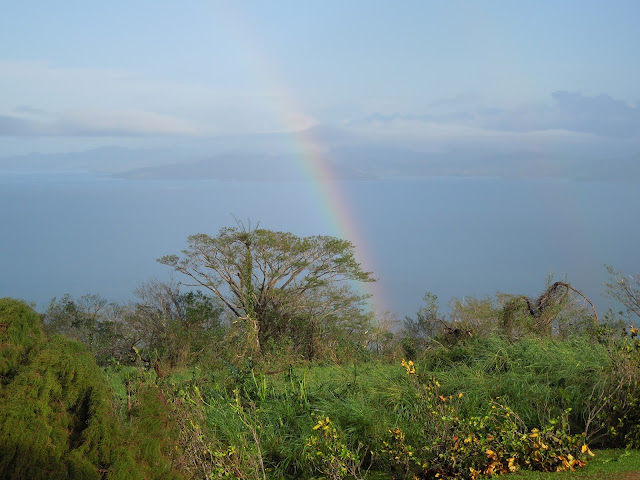There seems to be a striking difference in how native Fijians handle
a natural disaster versus how people in the U.S. react. After a devastating storm in the U.S. you
commonly see all these people on the news who are just destitute from the loss
of their property and possessions. I can
imagine the news footage now - people sobbing and in total despair of the loss
of their house and things. Many of us
will identify with them and feel sorry for someone who has “lost everything.”
The difference is that Fijians didn’t have this appearance of
despair after the worst cyclone in the history of the south pacific. When locals talked about the loss of their
house, there was no sign of sadness in their face. They were neutral (not happy, not sad). When they talked about having to cram their
multiple families in a tiny house, they seemed to welcome the company. One lady in particular, a local kindergarten
teacher, was telling me how nice it was to be around all the people; telling
stories, cooking and eating together.
It’s kind of like they just accepted the loss their house as a part of
life. This is a normal for them. Storms come and destroy their shit…that’s
life…it’s to be expected.
And, for the most part, there’s not a lot of “shit” to lose. Their house is usually fairly cheaply made
and is not filled with a bunch of extraneous possessions. The house has minimal furniture and is mostly
for containing the essentials for eating, drinking and sleeping. They are poor by U.S. standards.
However, that’s a huge misconception to see them as poor…they are
rich. They are rich with the
essentials. They have food everywhere
(plenty of cassava growing all around, coconuts abound, fruit trees everywhere,
plenty of fish in the sea). They have a
big, loving support network (given that they normally live in communities that
rely on each other to live). And, they
are content to just live, laugh and play.
They don’t need much else. They
are not missing their prized possessions, because they never put much value in
their possessions in the first place.
I can remember what it was like to drive down the road near the
villages the day after the storm. There
was devastated terrain everywhere; huge trees uprooted and thrown all over,
plants and tree stripped bare of their leaves, obvious loss of village
infrastructure and displaced families.
You couldn’t tell by looking at the people though. They were all sitting around in the village
like they would any other day – smiling and waiving as we passed by. “Bula” (the normal Fijian greeting) they said
as we passed by. Like nothing
happened.
This experience was very inspiring to me and reaffirmed to me many
things I’ve been thinking about life from travel around other parts of the
world. This is how people were meant to
live - relying on each other and age-old ways of living with nature (It
definitely helps that they live in a tropical and fertile area, which is really
what people are most naturally adapted to live in). It also goes to show how putting value in
material possessions is not natural and probably leads to a poorer life
experience…especially in times when mother nature takes it all.
Fijians put stock in land and family. Not in the stock market. Their wealth is real…it’s not just numbers in
a bank account or on a piece of paper.
It can be seen in their farm and family.
After that’s all sorted, they’re content to just spend their ample
leisure time relaxing, living and laughing with others. No need to join the rest of the world in
their endless quest for the latest gadgets and technology. They have all that they need.
With this lifestyle, it’s probably true that Fijians are not going
to be the next race to dominate the world with their industry or monetary
wealth. However, I’m convinced they’re
leading the world in quality of life.

No comments:
Post a Comment